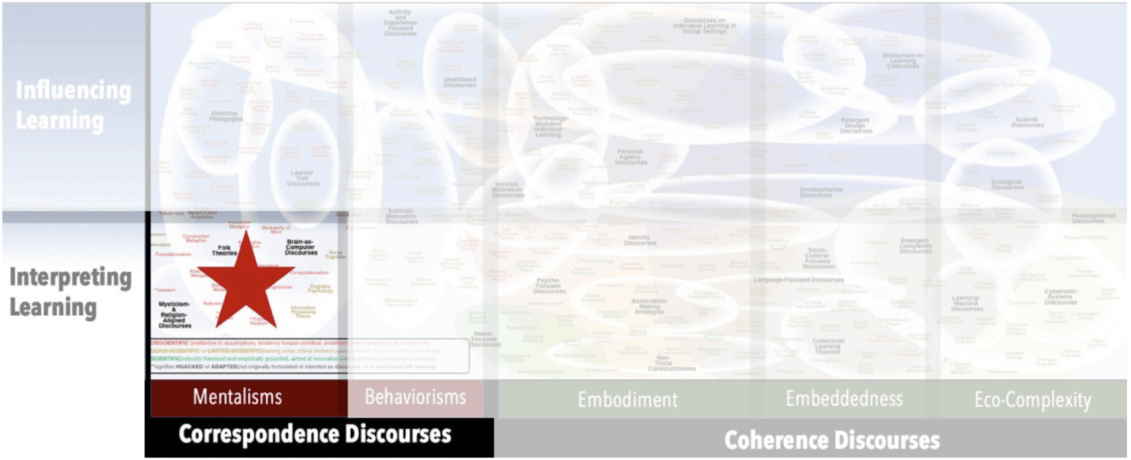AKA
Neural Quantium Theory
Quantal Hypothesis
Quantal Theory
Quantum Consciousness
(Note: should not be confused with Quantum Cognition)
Focus
Applying principles of quantum mechanics to matters of human thoughtPrincipal Metaphors
- Knowledge is … information
- Knowing is … using information
- Learner is … a quantum information processor (individual)
- Learning is … inputting (and associated computer-based notions, such as processing, storing, and retrieving)
- Teaching is … N/A
Originated
1960sSynopsis
Quantum Mind encompasses a range of discourses founded on the conviction that human consciousness cannot be explained in terms of classical mechanics, but it may be explainable in terms of quantum mechanical processes (e.g., entanglement, superposition). Prominent subdiscourses include:- Cellular Basis of Consciousness (Stuart Hameroff, 1990s) – the hypothesis that consciousness arises at the cellular level, rather than being an emergent product of large-scale neural networks or brain-wide activity
- Holonomic Brain Theory (Holographic Brain Theory) (Karl Pribram, 1970s) – drawing an analogy to the way a part of a hologram can contain the whole of its stored information, the assertion that a piece of a human’s long-term memory may work in a similar way
- Integrated Information Theory (Giulio Tononi, 2000s) – the suggestion that consciousness/mind is an emergent phenomenon, arising in the harmonious co-activity of neural networks. The associated mathematical model is intended to explain and assess the consciousness of a system, based on the relationships among past, present, and future states of its physical components.
- Orchestrated Objective Reduction Theory (Orch OR Theory) (Roger Penrose, Stuart Hameroff, 1990s) – the suggestion that consciousness begins at the quantum level inside neurons (as opposed to emerging in the complex interactions among neurons). The core process, “objective reduction,” is posited to occur in microtubules, where quantum superpositions (i.e., multiple possible state) collapse (“reduce”) into single states.
- Predictive Coding Theory (Karl Friston, 2020s) – the suggestion that human consciousness/mind is an emergent phenomenon, arising as cognitive processes receive and predict information – that is, that one’s reality is created by one’s expectations
- Quantum Information – the state of a quantum system – that is, the physical state of a quantum system does not “contain” information; it is information
- Qubit (Quantum Bit; Quron) – combining “quantum” and “bit,” a basic unit of Quantum Information – which, due to the nature of quantum phenomena, can be more than one bit of information
- Quantum Logic (John von Neumann, 1930s) – a system used to anticipate and summarize measurements from quantum apparatuses, but not a “logic” in the sense of formal reasoning processes
- Quantum Neural Network (Subhash Kak, Ron Chrisley, 1990s) – a model of neural networks founded on the idea that cognition is influenced by quantum effects, and so aimed at understanding and utilizing effects of quantum entanglement and interference as resources
Commentary
Criticisms of Quantum Mind and associated discourses are grounded in both empirical and theoretical arguments. Two prominent empirically grounded criticisms are that (1) the human body is too hot for quantum information processing and (2) the basic unit of brain function is the neuron, which is much too large for the principle of superposition (i.e., both firing and not firing) to apply. Regarding theoretical arguments, critics assert Quantum Mind dips into mysticism in the claim that quantum mechanics can somehow account for elements of human cognition that are currently unexplainable and uncomputable (contrast: Quantum Cognition). More fundamentally, proponents of Quantum Mind tend to build uncritically on the assumption that the brain is a computer (see Brain-as-Computer Discourses).Authors and/or Prominent Influences
Karl Pribram; David Bohm; Eugene Wigner; Roger PenroseStatus as a Theory of Learning
Quantum Mind is a discourse on learning, but there is no consensus among commentators that it offers any useful insights.Status as a Theory of Teaching
Quantum Mind is not at all concerned with matters associated with teaching or formal education.Status as a Scientific Theory
Quantum Mind falls short on all of our criteria for a scientific discourse.Subdiscourses:
- Cellular Basis of Consciousness
- Holonomic Brain Theory (Holographic Brain Theory)
- Integrated Information Theory
- Orchestrated Objective Reduction Theory (Orch OR Theory)
- Quantum Information
- Quantum Logic
- Quantum Neural Network
- Qubit (Quantum Bit; Quron)
- Systems Neuroscience
Map Location

Please cite this article as:
Davis, B., & Francis, K. (2025). “Quantum Mind” in Discourses on Learning in Education. https://learningdiscourses.com.
⇦ Back to Map
⇦ Back to List
